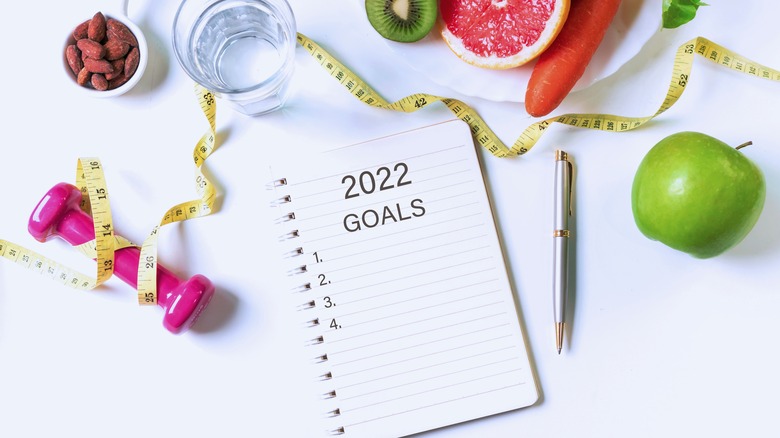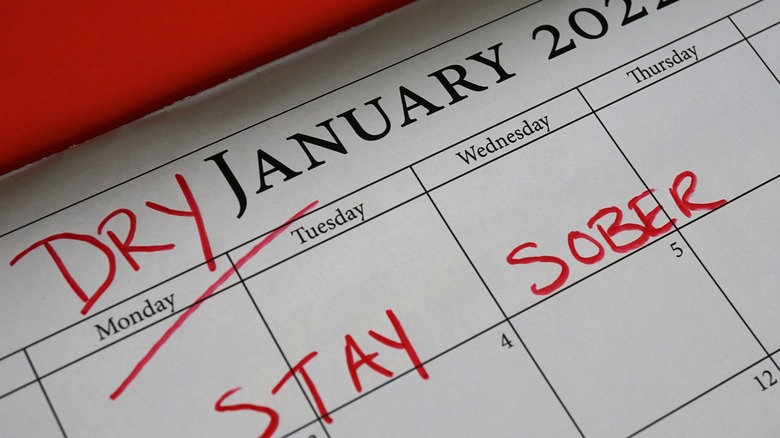How To Stick With Your Nutrition Resolutions After January Is Over
Many of us want to start off the new year on a high note by making plans to move forward into the future with improved finances, careers, and health. But a few weeks into January, we tend to bog down a bit. It's such a cold, dreary month, and that post-holiday let-down gets to us, you know? We tell ourselves we'll do better once the weather warms up, once the snow melts, once the skies are less cloudy and gray ... Yes, it's tough to keep going, so much so that The Daily Mirror says the second Friday in January has been dubbed Quitter's Day.
It's unrealistic to think you're going to reinvent yourself entirely over the course of a few weeks. Still, when it comes to taking steps toward improving your nutrition, it's never too late to start. More to the point, no matter how often you stray from your resolution, it's always in your best interest to climb back on board. In order to help you re-commit to your vows, nutritionist, cookbook author, and spokesperson for All-Purpose In The Raw Optimal Zero Calorie Sweetener Blend Robin Miller shares a few tips.
Take things one step at a time
Cookbook author Robin Miller, despite being a nutritionist, doesn't expect you to commit to an immediate, drastic change in your eating habits. Rather, she advises that you "set realistic, achievable goals" and says that the real goal should be "to modify a habit, not make major life changes." She suggests you make a list of all the things you'd like to accomplish — cut down on sugar, limit "white carbs," eat more fruit, stop eating fried foods, work out every day, etc. — and then just choose one of these things. If you succeed with one small goal, it will be easier to tackle the next one on your list. As Miller tells Mashed, "Large resolutions are harder to maintain than incremental changes in habits."
Even if you make your changes one at a time and keep them small, you may still stumble from time to time. But Miller says that's okay. "Minor hiccups are to be expected," she explains. "Don't beat yourself up for setbacks." Instead, she says, "Embrace them and use what you've learned as an opportunity to change your behavior" so you'll be better prepared to meet similar challenges in days to come. She also notes that it might help you to maintain momentum if you reward yourself for your achievements, no matter how small they are.
Don't let Dry January be an end in itself
One of the top resolutions people make regarding their health is to cut down on drinking,. To that end, many folks attempt a "Dry January." While that goal is to be applauded, just one month of abstinence won't compensate for 11 months of overindulgence. Nutritionist Robin Miller reminds us that refraining from alcohol is a healthy choice at any time of year, telling Mashed that cutting down on drinking "not only clears the mind and rejuvenates the body, but it also reduces your caloric intake and improves your sleep patterns."
Miller adds that even if you do drink, you should try to reduce your consumption by alternating non-alcoholic drinks with alcoholic ones. And if you drink your booze straight-up, you may be more likely to sip than chug. Miller also suggests volunteering to be the designated driver, something that will give you a socially acceptable reason to refrain from alcohol at parties and other gatherings.
Miller does say there's one problem that tends to crop up when you go booze-free — you may find yourself craving cookies and candy instead. The reason, she says, is that "sugar and booze affect many of the same neural pathways in the brain ... sugar mimics alcohol by increasing the release of dopamine and serotonin, reward-based chemicals that make you feel good." In order not to swap one bad habit for another, she suggests sticking with fruit or using alternative sweeteners derived from natural ingredients.
Miller's top health-based suggestion has nothing to do with diet
Nutritionist and cookbook author Robin Miller says one reason so many people fail to keep their healthy resolutions is that the resolutions are ill-defined. She says we're inclined to state our goals in broad terms like "lose weight" or "eat healthy" but cautions that "broadly defined resolutions are much harder to stick to that those that are specific and accompanied by a well thought-out plan for success." Not to mention, we may even go overboard and adopt super-strict resolutions, such as eating nothing but healthy foods.
As Miller notes, "Unrealistic goals will set anyone up for failure." She does have a suggestion for a great health-related goal we can all aim for, though. As she says, "Why isn't 'get more sleep' at the top of everyone's list?"
"Get more Z's," Miller says, "and you'll knock out most resolutions in one fell swoop: lose weight, reduce stress, improve mood, boost immunity, prevent disease, curb appetite, and reduce cravings." While more sack time alone won't make all the difference, it will do you a lot of good.
With this resolution, as with all resolutions, you'll still need to keep it specific and keep it achievable. Plan to go to bed, say, one hour earlier, and try turning your phone off so you're not tempted to spend time scrolling your social media feeds while waiting for sleep to come. They do still make analog alarm clocks, you know!



